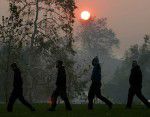Facing tragedy from miles away

October 31, 2007
Faisal Badani, a junior at Villanova, received a phone call with a tragic message while driving in his car last Monday: his family house had been destroyed by the California wildfires.
“My mom could see the fires looming from my bedroom window,” Badani said. “She and my dad grabbed some photo albums and other valuables before they evacuated.”
The origin of the fires dates back to Oct. 19, when California fire officials warned the San Diego region that rapid fire growth could result from a combination of fierce winds tied with low humidity in the area.
By Sunday the destruction had begun.
Uncontrollable wildfires grew rapidly in San Diego County, with the first flames occurring at 9:23 a.m in Potrero, a tiny suburban town north of the Mexican border.
The flames worsened by noon as winds shifted and engulfed over 345 homes.
As a resident of California, Badani noted that fires are a prevalent occurrence in the state due to the large amount of brush and forests.
“It comes close, but you never think it would happen to you,” Badani said. “My family went to my uncle’s house to try to collect their thoughts and deal with the situation.”
Forty miles north of Potrero, flames rose as high as 200 feet, engulfing the land at an alarming speed. The flames burned for days as harsh winds prevented helicopters from entering the area. By Sunday evening, 11 wildfires had been documented throughout Southern California, threatening the lives of thousands of residents.
The next day, evacuation orders were put in effect by the state that moved over 300,000 residents out of their homes.
Branden McBirney, a sophomore at Villanova from Palos Verdes, Calif., has a cousin, Miguel, from Laguna Beach who has currently opened her house to 12 people seeking refuge from the fires.
“All of her friends from college came to stay with her,” he said. “They have no idea when they can go back and check everything out. They are not being told anything.”
Besides the uncontrollable flames and constant evacuation notices, the health issues in the area are growing due to the presence of ash in the air.
McBirney’s mother, a teacher in the Los Angeles area, has worn a mask the entire week due to the thickness of the ash.
“Everyday she would measure the ash on her car with a ruler,” McBirney said. “The worse it has been so far is 2 inches.”
While some areas of California have been saved from the fires, there are other places where the flames are too intense for even firefighters and officials to have an impact.
Firefighters in Rancho Bernardo pleaded for help as they were an uneven match against the intensity of the flames in this area.
“Rancho Bernardo got hit the worst,” said Jack Ryan, a Villanova junior from Pacific Beach, Calif. “People have no idea where they are going to live or what they are going to do.”
Amanda Slattery, a sophomore communications major from La Canada, Calif., first found out about the destruction in Rancho Bernardo on the Internet.
“I pulled up the article, and there was a picture of a house burning,” Slattery said. “I immediately called my mom because that is the town where my grandfather and great-grandfather live.”
Slattery’s grandfather immediately evacuated the area and went to his neighbor’s house because all of the main freeways were shutdown. All of the cable lines are destroyed, forcing her mother to remain in contact with their grandfather via cell phone.
Her grandfather’s house was not destroyed by the flames. However, homes in adjacent streets were destroyed, leaving pieces of neighboring houses in his yard.
By Monday afternoon, government officials closed all schools and courts in the San Diego area, as well as many offices and stores. Families fled to evacuation centers throughout the region with their pets and whatever possessions they could carry with them.
For families like the Badanis, rebuilding homes and replacing material objects will be easy. It’s the priceless memories that will be hard to recover.
“We want to try and re-build on the same land,” Badani said. “It’s not the material things but the memories attached to them. The bicycle I learned how to ride on was in that house. These are things I can never get back.”
Along with his house, seven other houses in Badani’s neighborhood burned down, leaving only ash where years of memories once stood.
Furthermore, Badani hasn’t seen his family since the fires.
“The whole city is shutdown,” he said. “I am going home in couple of weeks – hopefully by Thanksgiving.”
Thousands of miles away from his family, Badani said his friends and roommates have been extremely supportive throughout this tough time.
His parents have also been there for him, even though they can’t be together.
“My dad is trying to be strong for me and my sister,” he said. “But he was really upset.”
It is difficult to imagine the fact that many Villanovans will be returning home this Thanksgiving to an entirely new home environment – one they probably would have never imagined.
Losing a lifetime of memories in one day is certainly a traumatic experience for anyone, but Badani looks at the brighter side of the situation: at least his family is safe.










